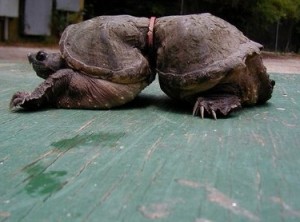The word ‘Tosser’ in the Oxford English dictionary means – ‘a person or thing that throws something’
There is no need for me to tell you the other meaning that is commonly used around the world. However in this article it will refer to both at the same time as someone who tosses trash into the ocean, truly is a tosser.
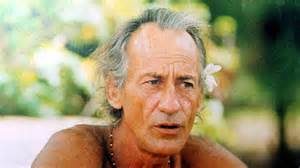 Throughout history people have been tossers and it has become a very bad habit that today we are trying to correct to save our oceans. I recently read Peter Nichols ‘A Voyage for Madmen’ which is all about the Golden Globe race held back in the late 60’s. On page 125 we find one of the legends of our sport, Bernard Moitessier tossing gear overboard to lighten his load. Items included a box of army biscuits (35 lbs), a case of condensed milk (45 lbs), 25 bottles of wine, 45 pounds of rice, 10 pounds of sugar, 30 pounds of jam, a box of batteries, four jerry cans of Kerosene, gallons of denatured alcohol and a coil of ¾-inch nylon line weighing 60lbs. Considering he is an avid environmentalist, it was really surprising to read this, but it was through lack of knowledge that this was done. He obviously believed that his small contribution wouldn’t make a difference, yet here we are 45 years later trying to work out how to reverse the problem of everyone’s individual contribution. And consider this, under the international rules of sailing Rule 55, he could have been disqualified from the Golden Globe Race.
Throughout history people have been tossers and it has become a very bad habit that today we are trying to correct to save our oceans. I recently read Peter Nichols ‘A Voyage for Madmen’ which is all about the Golden Globe race held back in the late 60’s. On page 125 we find one of the legends of our sport, Bernard Moitessier tossing gear overboard to lighten his load. Items included a box of army biscuits (35 lbs), a case of condensed milk (45 lbs), 25 bottles of wine, 45 pounds of rice, 10 pounds of sugar, 30 pounds of jam, a box of batteries, four jerry cans of Kerosene, gallons of denatured alcohol and a coil of ¾-inch nylon line weighing 60lbs. Considering he is an avid environmentalist, it was really surprising to read this, but it was through lack of knowledge that this was done. He obviously believed that his small contribution wouldn’t make a difference, yet here we are 45 years later trying to work out how to reverse the problem of everyone’s individual contribution. And consider this, under the international rules of sailing Rule 55, he could have been disqualified from the Golden Globe Race.
One of the worst habits that has begun years ago is tossing your cigarette butts out the window or overboard. I was recently talking to another cruising sailor in Colon, Panama. He was smoking a cigarette butt right in front of me and I was waiting to see what he would do with it. After finishing he did what so many people do, tossed it in the ocean. I said to him ‘You can’t do that.’ His response was ‘It will disappear.’ I asked him if it had a filter which he said ‘yes’. I asked what the filter was made of and he said ‘foam’. I then asked ‘what is foam?’ to which he responded ‘I didn’t think about that, I won’t do that again.’
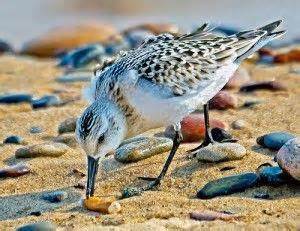 Most cigarettes have filters in them and these filters are the real issue that our oceans and the creatures that inhabit them are faced with. These filters, being a plastic substance, will never disappear entirely. O.K they might break up into smaller pieces but they will forever be in existence in one form or another. Hence ‘Tossing’ your cigarette out the window of your car, putting it out on the ground or throwing it over board makes you a ‘Tosser’
Most cigarettes have filters in them and these filters are the real issue that our oceans and the creatures that inhabit them are faced with. These filters, being a plastic substance, will never disappear entirely. O.K they might break up into smaller pieces but they will forever be in existence in one form or another. Hence ‘Tossing’ your cigarette out the window of your car, putting it out on the ground or throwing it over board makes you a ‘Tosser’
I recently wrote an article on Aluminium Cans and the ocean which stated that the humble aluminium can contains a plastic inner and outer lining so that when you toss it overboard, it will not disappear entirely like many people think. Once again, the plastic portion will last forever in some form. The same can be said about the beer bottle cap. It too has a plastic lining which you can see for yourself if you look closely. Without this lining, if the bottles are on the side, eventually they would eat away at the bottle cap and your precious alcohol would be destroyed or worse, gone. That really would be alcohol abuse!!!
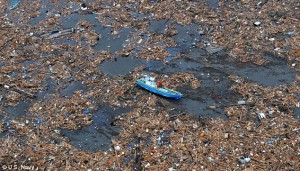 Most racing yachts will go to sea with bottled water in plastic. In fact at the end of the race, I am sure most of you will find plenty of half drunk bottles floating around rope bags in the cockpit or maybe even in the bilges. It is well publicised that water in plastic is not good for you with the Bishenol-A (BPA) used in plastic bottles leeching into the water over time. This is why bottled water has a ‘used by’ or ‘best before’ date. This is when it is deemed that the water has become unsafe for human consumption. Water in a tap does not go off! On our recent transit of the Panama Canal, it was told to us that we must provide our advisor with bottled water. We argued the case with our agent and provided him a sample of our water onboard which was from our watermaker and then filtered. On tasting it he said it was very good and would suffice, but again it was a case of having to argue our case. All in a country where the drinking water is exceptional. So consider alternatives like fitting a filter system on your drinking water. Our system cost under $100 and produces far nicer water. Stainless Steel drink bottles for each crew member filled from the tanks will save you the plastic water bottle issue and keep them far healthier.
Most racing yachts will go to sea with bottled water in plastic. In fact at the end of the race, I am sure most of you will find plenty of half drunk bottles floating around rope bags in the cockpit or maybe even in the bilges. It is well publicised that water in plastic is not good for you with the Bishenol-A (BPA) used in plastic bottles leeching into the water over time. This is why bottled water has a ‘used by’ or ‘best before’ date. This is when it is deemed that the water has become unsafe for human consumption. Water in a tap does not go off! On our recent transit of the Panama Canal, it was told to us that we must provide our advisor with bottled water. We argued the case with our agent and provided him a sample of our water onboard which was from our watermaker and then filtered. On tasting it he said it was very good and would suffice, but again it was a case of having to argue our case. All in a country where the drinking water is exceptional. So consider alternatives like fitting a filter system on your drinking water. Our system cost under $100 and produces far nicer water. Stainless Steel drink bottles for each crew member filled from the tanks will save you the plastic water bottle issue and keep them far healthier.
We’ve been cruising the world as part of our Plastic in the Pacific Crusade and been to many marinas. We talk to lots of cruisers and many speak of the plastic they have seen themselves and how bad plastic is. So you can imagine our frustration when a fellow cruiser is walking down the street with a back pack on with nothing much in it and they are carrying a plastic bag with the milk and paper in it. It takes initiative to say no to plastic bags and plastic. One person even told me they felt that the checkout lady was offended when they didn’t want plastic bags. Well offend away. Show them a dead turtle due to a plastic bag and see if that offends them more.
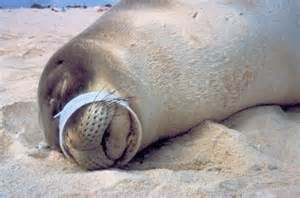 Some of the more recent findings that are now being promoted are microbeads and washing clothes. Microbeads have appeared in body washes and scrubs all over the world. There is a real move to ban them at present. The result of using these products is lots of micro plastics enter the oceans through our drains and that can’t be good for anyone. Choosing products without microbeads is simple. Washing your clothes is another one. If you wash all your synthetic clothes, thousands and millions of micro plastics are released into the waste water system. The only option is to buy organic fibres. It is a choice at the shops that makes a big difference.
Some of the more recent findings that are now being promoted are microbeads and washing clothes. Microbeads have appeared in body washes and scrubs all over the world. There is a real move to ban them at present. The result of using these products is lots of micro plastics enter the oceans through our drains and that can’t be good for anyone. Choosing products without microbeads is simple. Washing your clothes is another one. If you wash all your synthetic clothes, thousands and millions of micro plastics are released into the waste water system. The only option is to buy organic fibres. It is a choice at the shops that makes a big difference.
So why is this all important? Why should you do something when so many others aren’t. Well consider this, we are borrowing this world from our children and future generations. It’s not our world, it is their future. What we do today will affect their futures whether we like it or not. The simple act of being a ‘TOSSER’ today could mean a world with no marine life, limited oxygen and more disease than we have today. Sounds drastic right? Well consider these facts:
 100,000+ Marine creatures die from plastic suffocation and entanglement every year.
100,000+ Marine creatures die from plastic suffocation and entanglement every year.- 1 million plus sea birds die of the same thing.
- 95% of the world’s large fish contain plastic which we will consume if we eat fish.
- 60-80% of the world’s oxygen comes from the ocean
- Plastics are related to growing numbers of cancers, autism, ADHD and more diseases than you can imagine.
If you look at the increase in our use of plastic and the rise in diseases such as cancer, to me they are growing at the same rate. Is it coincidence or is it fact?
The simple answer for us that use the ocean as our playground, our office, and even our home, is that CLEAN OCEANS MAKE US ALL WINNERS.
We teach youth through our online education program that PREVENTION IS BETTER THAN A CURE.
REFUSING plastic is the first step, well before REDUCING, REUSING and RECYCLING.
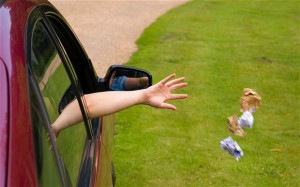 So don’t be a TOSSER. If you can’t say ‘DON’T PANIC, IT’S ORGANIC’ then don’t toss it. Put it in the bin and deal with it properly. Our future generations will love you for it.
So don’t be a TOSSER. If you can’t say ‘DON’T PANIC, IT’S ORGANIC’ then don’t toss it. Put it in the bin and deal with it properly. Our future generations will love you for it.
By Ian Thomson – Founder Ocean Crusaders
For more details visit www.OceanCrusaders.org
Ocean Crusaders are out to change the way people treat our oceans. Our online education program is free to download at www.OceanCrusaders.org/education where children can learn of the issues our oceans are facing and how they can make a difference. The Plastic in the Pacific Crusade is about educating the South Pacific Islands, finding out what is happening in these islands and updating our programs. You can join us in the Pacific and see for yourself what we do.
Ocean Crusaders Plastic in the Pacific Crusade is proudly supported by: Cressi Dive Gear, Gill Marine, Keen Footwear Australia, Barz Optics Sunglasses, Maxsea Navigation Software, Digital Diver Cairns, LED Dive Lights Australia, Boat Names Australia, Predictwind Weather & Sail-world.com
